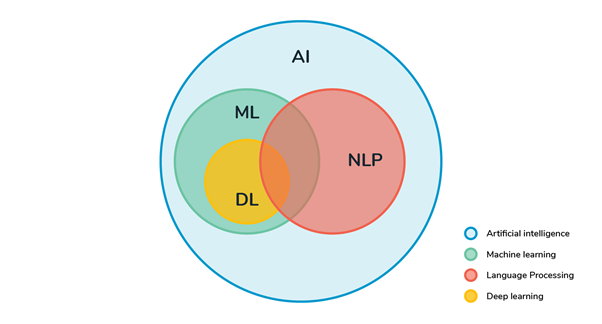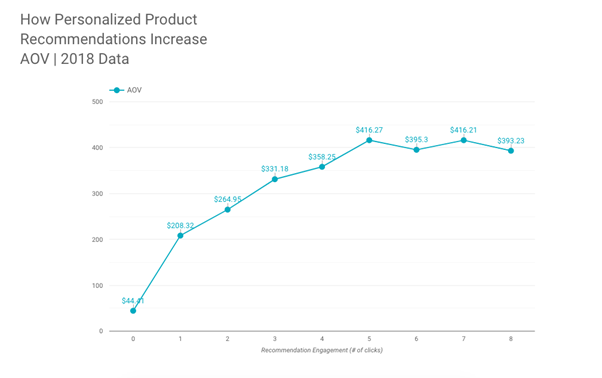How do you know a robot is not writing this copy? We could have a whole team of cyborgs here at MarTech Alliance 🤖. Even Paco the Office Pug could be made of chrome and LEDs.
And with the growth of Natural Language Processing, this fantasy could become a reality. Apart from maybe the Paco thing.
So, what is NLP?
Well, Natural Language Processing or NLP is a type of artificial intelligence. It basically allows for computers to interpret language like a human being, using this insight to write and respond in a 'natural' way.
Plus, according to the Natural Language Processing Research Report, the global market is expected to reach a whopping $22.9B in 2024.

NLP combines computational linguistics (data and rule based modelling of human language) and statistical ML and deep learning models. This double act allows for the computer to process speech and words in order to extract the writer's intent.
But how does it help marketers? Hold your horses, we'll get to it. NLP can be used to augment all sorts of human teams, and give companies insight into what works in their industry, and what doesn't. It's all about competing, in a competitive landscape.
NLP can create an effective customer experience through its ability to understand demand and customer intent, and supply i.e. products.
So, day-to-day. What tasks can NLP help with?
- Speech Recognition
- Grammatical Tagging. This means determining the part of the 'part of speech' of a piece of text. So, the AI will figure out the noun, pronoun, adjective etc. of the speech.
- Sentiment Analysis
- Language Generation
- Named Entity Recognition. NEM involves identifying 'useful' words. This might mean knowing that 'Paco' is a name, or 'London' is a place.
How can NLP be used in marketing?
First things first, NLP is basically a fantastic way of taking all that data, and making something from it. It's ability to utilise language analytics to extract insight means you get an overview of motivations, intentions, and buying journey, without having to slog through a mound of unorganised data.
So, in what other aspects would NLP give companies a leg up?
NLP and...Content Creation
Being able to produce relevant, helpful, or entertaining content can give your brand the stage it needs. But luckily NLP and AI can help.
Using this tech, content writers and producers will be able to generate content at a far more rapid pace. For example, certain AIs can auto-suggest the next sentence, based on the text that has come before. Some AIs can even produce long-form content based on a set topic.
Because NLP can help produce content, this can help with your SEM strategy.
Topic extraction is another way NLP can help your content. This is the act of obtaining common themes from a set of data, which can be useful in finding out what your readers want from your content. So, it can search through what consumers are talking about on websites, social media, or forums, and identify common interests. Then, from these common interests, it can create content.
But what about content creation at scale? Creating individual pages for each topic or product might be a content creator's worst nightmare. But AI doesn't get bored using the same three adjectives over and over.
Ecommerce platforms like Alibaba use NLP and AI to handle their boring and labour-intensive writing tasks. Plus, some clothing brands have even used the tech to write product descriptions for their foreign-language sites.
NLP and...Targeted Messaging
It's the battle of the acronyms; NLP and AI can aid in ABM. With NLP tools, your team can keep up-to-date with potential, and current, customers' needs and pain points.
Information gathered from the AI can help you create a fully-fledged image of your client, letting your team know who and when to target.
This targeted messaging can also help in facilitating customer purchases. Ecommerce platforms who keep customers interested through personalised content keep purchases high, and cart abandonment low. They can even point clients towards products they didn't even know they wanted.
In fact, product recommendations account for a third of this industry's revenue, and can improve cart abandonment rates by 4.35%
 So, this shows a move away from keywords as the traditional focus of product recommendations. NLP can offer recommendations with added context and data to keep products relevant and timely.
So, this shows a move away from keywords as the traditional focus of product recommendations. NLP can offer recommendations with added context and data to keep products relevant and timely.
But a step before targeting, comes audience identification. NLP can help with both of these. But analysing common keywords and themes, the IA can tell you quite a bit more about who is reaching out, and how to appeal to them. So, through customer questions, you might be able to tell the customer's job, industry, and stage of buying. Then, using this, you can create targeted and personalised messaging.
NLP and...Keyword Detection
Okay, okay. I know we just trashed keywords a bit, but they can be super useful for SEO techniques.
NLP can help utilise all that qualitative data, and help you understand clients, and how they perceive your company. Just by seeing how your company's name appears in conversations, you can see how well your branding is doing in the eyes of your clients.
NLP can help through analysing large data sets from a variety of sources, such as webpages, social media, and more. Then, you can identify keywords, intentions, and sentiments.
Keyword detection can also generate a shortlist of popular words from your text data, and match it against your current SEO keyword shortlist. Then, you can look for commonalities, and figure out where your customers' interests lie. So, you might find out that customers have more of an interest in one particular topic, or even find out that your site has more questions about pricing than features. From there, you can curate your approach and match the focus of your content or FAQs to focus on what your customers need.
NLP and...Customer Experience
So, we've established that NLP can extract the intent and sentiment behind language. This can be used in a number of different ways, but this section is going to focus on how it can provide a more streamlined and stress-free experience for your customer directly.
For example, it can aid in the 'voice of the customer', something that can aid in effective customer-centric marketing. 'Voice of the customer' is a term which refers to your customer's feedback about their experience with your brand, focusing on their needs, expectations, understandings, and product improvement.
An AI which utilises this technique is IBM's Watson Assistant tool, which uses language analytics to process and respond to customer feedback, either in voice or chat format.
Another way NLP can help the customer experience is by deriving the tone, sentiment, or context from a conversation with a customer, and using this to drive them towards conversions. And if you're feeling luxurious, there are some AIs which can even look at the sentiments of large groups and group conversations. Through this sentiment analysis, companies can aid their brand monitoring, competitive research, product analysis etc. etc.
The customer experience could also be aided in the development of mobile digital shopping assistants, which utilise NLP. From completing addresses and card info, to completing routine tasks, the AI can take up many mundane tasks.
NLP and...Identification of Trends
And this isn't just identification of trends, oh no. This is the early identification of trends. Think morning-dew, cockerel-still-sleeping early.
NLP can be used in the area of relevant news aggregation, which means that marketers can extract relevant content about their brand from new sites, articles, and other sources of data.
According to Stanford University's Abigail See, automatic summarisation has moved from the simplistic version (extractive summarisation) where content from the source is shortened and rearranged, to the more complex (abstractive summarisation), where summaries are made up of generated content ad hoc.
NLP and...Social Media Listening
Social media listening can be super helpful in understanding consumer habits, both in terms of intent to purchase and post-purchase. It can predict product demand, or monitor trends, or even create targeted marketing messages.
So NLP, using studies and data points, can help marketers push the right messaging at the right time. So, they might find that people are feeling motivated in the first weeks of January, and promote messaging related to this emotion.
